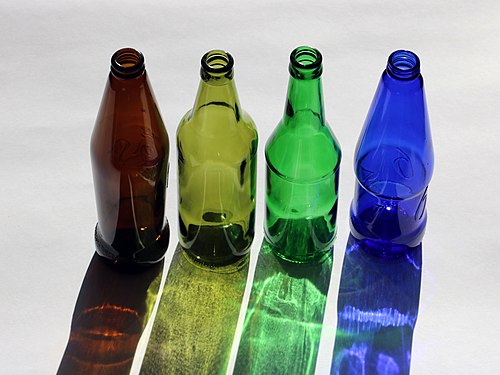Flasknoun
A narrow-necked vessel of metal or glass, used for various purposes; as of sheet metal, to carry gunpowder in; or of wrought iron, to contain quicksilver; or of glass, to heat water in, etc.
Flasknoun
A container used to discreetly carry a small amount of a hard alcoholic beverage; a pocket flask.
Flasknoun
(sciences) Laboratory glassware used to hold larger volumes than test tubes, normally having a narrow mouth of a standard size which widens to a flat or spherical base.
Flasknoun
(engineering) A container for holding a casting mold, especially for sand casting molds.
Flasknoun
A bed in a gun carriage.
Flaskverb
(dentistry) To invest a denture in a flask so as to produce a sectional mold.
Flasknoun
A small bottle-shaped vessel for holding fluids; as, a flask of oil or wine.
Flasknoun
A narrow-necked vessel of metal or glass, used for various purposes; as of sheet metal, to carry gunpowder in; or of wrought iron, to contain quicksilver; or of glass, to heat water in, etc.
Flasknoun
A bed in a gun carriage.
Flasknoun
The wooden or iron frame which holds the sand, etc., forming the mold used in a foundry; it consists of two or more parts; viz., the cope or top; sometimes, the cheeks, or middle part; and the drag, or bottom part. When there are one or more cheeks, the flask is called a three part flask, four part flask, etc.
Flasknoun
bottle that has a narrow neck
Flasknoun
the quantity a flask will hold
Flasknoun
a container for liquids.
Flasknoun
a narrow-necked glass container, typically conical or spherical, used in a laboratory to hold reagents or samples.
Flasknoun
a narrow-necked bulbous glass container, typically with a covering of wickerwork, for storing wine or oil.
Flasknoun
a vacuum flask.
Flasknoun
a hip flask.
Flasknoun
the contents of a flask
Flasknoun
an extremely strong lead-lined container for transporting or storing radioactive nuclear waste.
Flasknoun
short for powder flask
Bottlenoun
A container, typically made of glass or plastic and having a tapered neck, used primarily for holding liquids.
Bottlenoun
The contents of such a container.
Bottlenoun
A container with a rubber nipple used for giving liquids to infants, a baby bottle.
Bottlenoun
Nerve, courage.
Bottlenoun
A container of hair dye, hence with one’s hair color produced by dyeing.
Bottlenoun
(obsolete) A bundle, especially of hay; something tied in a bundle.
Bottlenoun
(figurative) Intoxicating liquor; alcohol.
Bottlenoun
(printing) the tendency of pages printed several on a sheet to rotate slightly when the sheet is folded two or more times.
Bottlenoun
A dwelling; habitation.
Bottlenoun
A building; house.
Bottleverb
(transitive) To seal (a liquid) into a bottle for later consumption. Also fig.
Bottleverb
To feed (an infant) baby formula.
Bottleverb
To refrain from doing (something) at the last moment because of a sudden loss of courage.
Bottleverb
To strike (someone) with a bottle.
Bottleverb
To pelt (a musical act on stage, etc.) with bottles as a sign of disapproval.
Bottlenoun
A hollow vessel, usually of glass or earthenware (but formerly of leather), with a narrow neck or mouth, for holding liquids.
Bottlenoun
The contents of a bottle; as much as a bottle contains; as, to drink a bottle of wine.
Bottlenoun
Fig.: Intoxicating liquor; as, to drown one's reason in the bottle.
Bottlenoun
A bundle, esp. of hay.
Bottleverb
To put into bottles; to inclose in, or as in, a bottle or bottles; to keep or restrain as in a bottle; as, to bottle wine or porter; to bottle up one's wrath.
Bottlenoun
glass or plastic vessel; cylindrical with a narrow neck; no handle
Bottlenoun
the quantity contained in a bottle
Bottleverb
store (liquids or gases) in bottles
Bottleverb
put into bottles;
Bottle
A bottle is a narrow-necked container made of an impermeable material (clay, glass, plastic, aluminium etc.) in various shapes and sizes to store and transport liquids (water, milk, beer, wine, ink, cooking oil, medicine, soft drinks, shampoo, and chemicals, etc.) and whose mouth at the bottling line can be sealed with an internal stopper, an external bottle cap, a closure, or a conductive using induction sealing. Some of the earliest bottles appeared in China, Phoenicia, Crete, and Rome.






















